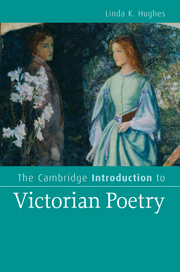Book contents
- Frontmatter
- Contents
- List of figures
- Preface
- Acknowledgments
- Editions cited
- Introducing Victorian poetry
- Part I The forms of Victorian poetry
- Part II The rhetoric of Victorian poetry
- Introduction to Part II
- 4 Poetry, technology, science
- 5 Poetry and religion
- 6 Poetry and the heart's affections
- 7 Poetry and empire
- 8 Poetic liberties
- 9 Resisting rhetoric: art for art's sake
- Part III Coda Close readings
- Glossary
- Notes
- Further reading
- Index
- Cambridge Introductions to Literature
8 - Poetic liberties
Published online by Cambridge University Press: 05 June 2012
- Frontmatter
- Contents
- List of figures
- Preface
- Acknowledgments
- Editions cited
- Introducing Victorian poetry
- Part I The forms of Victorian poetry
- Part II The rhetoric of Victorian poetry
- Introduction to Part II
- 4 Poetry, technology, science
- 5 Poetry and religion
- 6 Poetry and the heart's affections
- 7 Poetry and empire
- 8 Poetic liberties
- 9 Resisting rhetoric: art for art's sake
- Part III Coda Close readings
- Glossary
- Notes
- Further reading
- Index
- Cambridge Introductions to Literature
Summary
But the arm of the elders is broken, their strength is unbound and undone.
A. C. Swinburne, “A Song in Time of Revolution. 1860.” (Spectator [June 28, 1862])I read a score of books on womanhood
To prove, if women do not think at all,
They may teach thinking.
Elizabeth Barrett Browning, Aurora Leigh, Book 1 (1856)I am that thing
Called half a dozen dainty names, and none
Dainty enough to serve the turn and hide
The one coarse English worst that lurks beneath.
Augusta Webster, “A Castaway” (1870)Expressing solidarity with foreign revolution could indirectly critique British tyranny and shore up the cause of liberty at home, as in Swinburne's “A Song in Time of Revolution. 1860,” written in response to the Italian uprising against Austrian rule. Earlier Ernest Jones had celebrated the outbreak of revolutions from Italy and Poland to Paris in the 1848 Labourer: “The nations are all calling, / To and fro, from strand to strand; / Uniting in one army.” When he gave a speech that advocated flying a Chartist flag over parliament, however, Jones was arrested and spent two years in solitary confinement without pens or paper (and only scant food). Undaunted, he continued to write poems with his own blood in the margins of his cell prayer book and published them on his release.
- Type
- Chapter
- Information
- The Cambridge Introduction to Victorian Poetry , pp. 214 - 238Publisher: Cambridge University PressPrint publication year: 2010



